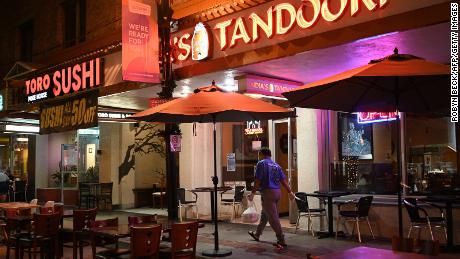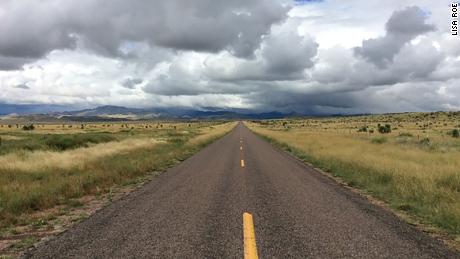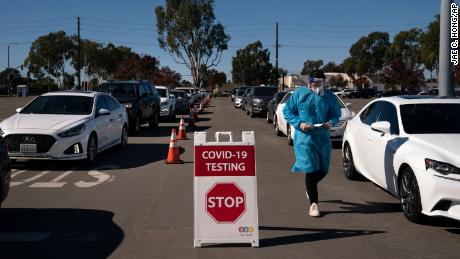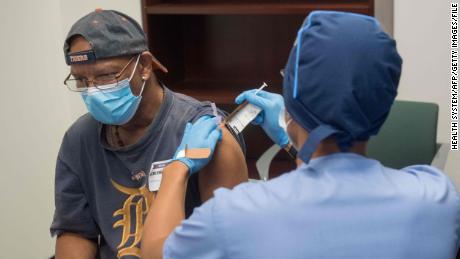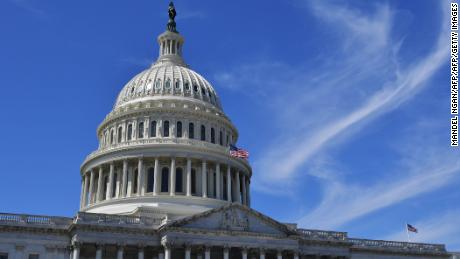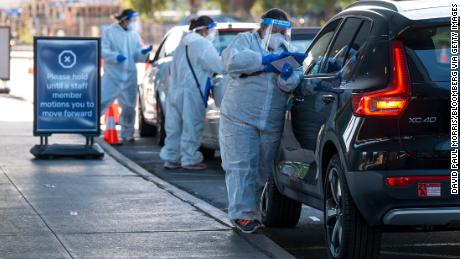It’s too early to know how bad the Covid-19 surge from Thanksgiving will be. But many hospitals are already at capacity.
In Rhode Island, residents received an alarming public safety warning on their phones Monday:
“Help the frontline by staying home as much as possible for the next two weeks. Work remotely if you can, avoid social gatherings, get tested. If we all decrease our mobility, we will save lives.”
The state has put together two field hospitals, one of which will start taking patients Monday, said Audrey Lucas, press secretary for Gov. Gina Raimondo.
The other field hospital could start taking patients as early as this week.
“Even if you open a field hospital, if you have hundreds of staff who are sick — which is what many states across the country are currently facing — if you don’t have nurses and doctors and respiratory techs, even a field hospital isn’t going to save you,” Ranney said.
“Our health care system is literally at the breaking point right now, thanks to Covid-19.”
In West Virginia, state officials told hospitals to prepare to delay elective surgeries as the Covid-19 numbers surge.
“Look at not doing the kinds of surgeries that can be put off,” state Health and Human Services Secretary Bill Crouch said Monday.
Crouch said he expects the voluntary delay on surgeries to last 45 days.
West Virginia’s Covid-19 czar, Dr. Clay Marsh, gave this sobering assessment: “Perhaps the worst days are ahead of us.”
Birx wants Thanksgiving travelers to get tested
“If your family traveled, you have to assume that you were exposed and you became infected,” White House coronavirus task force coordinator Dr. Deborah Birx told CBS on Sunday.
She also recommended those older than 65 get tested immediately if they develop any symptoms.
“If you’re over 65 or you have comorbidities and you gathered at Thanksgiving — if you develop any symptoms, you need to be tested immediately,” Birx said.
November has been a month of unprecedented Covid-19 surge. More than 30% of all cases ever reported in the US happened just this month, according to data from Johns Hopkins University.
Testing has also increased, but not at the same pace as new cases. About 23% of all Covid-19 tests were performed in November, according to the Covid Tracking Project.
Now the big concern is overwhelmed hospitals — which inevitably leads to more deaths.
“There’s no way that the hospitals can be fully prepared for what we’re currently facing,” Ranney said.
“This is like a natural disaster occurring in all 50 states at the same time. There are not adequate beds. There are not adequate staff. And because of the lack of national preparation, there are still not adequate supplies.”
And that’s before any Thanksgiving-related infections and hospitalizations, which won’t be known for days or weeks.
Statistics reported in the days after the holiday might show a relative dip in Covid-19 cases, followed by a surge due to a lag in government agencies’ reporting over the long weekend.
“When you look at people who are hospitalized today, they were infected two weeks ago, maybe more,” said Dr. Jonathan Reiner, a professor of medicine at George Washington University.
“And then it takes usually another week for folks to succumb to the illness.”
(More) good news on the vaccine front
Moderna said it plans to apply Monday for emergency use authorization (EUA) of its Covid-19 vaccine.
The company will ask the US Food and Drug Administration to review expanded data showing the vaccine is 94.1% effective at preventing Covid-19 and 100% effective at preventing severe cases of the disease.
“This is striking,” said Dr. Paul Offit, a member of the FDA’s vaccine advisory committee. “These are amazing data.”
An FDA advisory committee is scheduled to meet December 10 to discuss the Pfizer/BioNTech vaccine, and on December 17 to discuss the Moderna vaccine.
If all goes well, “we could be seeing both of these vaccines out and getting into people’s arms before Christmas,” US Health and Human Services Secretary Alex Azar told “CBS This Morning” on Monday.
Lt. Gen. Paul Ostrowski, director of supply, production and distribution for Operation Warp Speed, said he expects “a hundred percent of Americans that want the vaccine will have had the vaccine” by June.
“We will have over 300 million doses available to the American public well before then,” Ostrowski told MSNBC.
Most states are struggling
As of Monday morning, at least 43 states had test positivity rates higher than 5% — meaning more than 5% of tests taken were positive for coronavirus, according to Johns Hopkins University and the Covid Tracking Project.
Some states are far exceeding that threshold — including Idaho (44.35%), South Dakota (41.36%), and Iowa (40.26%).
California Gov. Gavin Newsom said he is considering “drastic action,” including reinstating a stay-at-home order, as projections show the surge of Covid-19 cases will cause the state’s intensive care unit capacity to be overrun by Christmas Eve.
Hospitalizations could double or triple within the next month if there are no major changes, he said. They are expected to reach 78% of capacity statewide with even higher numbers in Southern California and other areas, Newsom said in a news conference.
“If these trends continue, California will need to take drastic action,” Newsom said from home, where he is quarantined with his family.
But some parts of the country are slowly returning to normal.
In New York City, once the epicenter of Covid-19 in the US, public school students up to fifth grade will return to in-person learning in early December, Mayor Bill de Blasio said.
Students will be tested weekly and parents will be required to sign a consent form for every student that will take in-person classes, de Blasio said.
Even so, the state had a test positivity rate of 4.57% as of Monday — the highest rate since May, Gov. Andrew Cuomo said.
CNN’s Ben Tinker, Cheri Mossburg, Steve Almasy, Amanda Watts, Alec Snyder, Naomi Thomas, Leanna Faulk and Sheena Jones contributed to this report.
![]()




